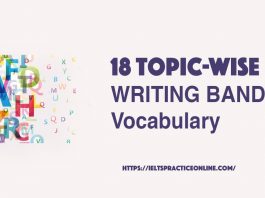Lesson 15: Arts
- art appreciation – understanding the qualities of great art
- appealing – attractive or interesting
- aesthetics – the formal study of the principles of art and beauty
- artefact – an object that is made by a person, such as a tool or a decoration, especially one that is of historical interest
- ballerina – a female ballet dancer
- ballet – a type of dancing where carefully organized movements tell a story or express an idea
- carving – a shape or pattern cut into wood or stone or the skill of doing this
- conception – an idea about what something is like, or a general understanding of something
- concert – a performance of music by one or more musicians
- crafts – skill and experience, especially in relation to making objects
- emotion – a strong feeling such as love or anger
- exhibition – a collection of things shown publicly
- expression – the act of saying what you think or showing how you feel using words or actions
- festival – an organized set of special events, such as musical performances or plays
- inspiration – someone or something that gives your ideas for doing something
- intimacy – a situation in which you have a close friendship or sexual relationship with someone
- literature – writing that has lasting value as art performing
- arts – acting, singing, dancing, and other forms of public entertainment
- portrait – a painting, photograph, or drawing of a person
- venue – the place where a public event or meeting happens
- abstract – paintings, designs etc consist of shapes and patterns that do not look like real people or things
- accomplished – skilled
- burgeoning – developing quickly
- classical – traditional in style or form
- distracting – preventing concentration or diverting attention; disturbing
- eclectic – consisting of different types, methods, styles, etc.
- electric – very exciting
- fundamental – basic; primary; essential
- literary – connected with literature
- mundane – very ordinary and therefore not interesting
- passionate – full of emotion
- vivid – brightly coloured or (of descriptions or memories) producing clear, powerful, and detailed images in the mind
- choreograph – to arrange how dancers should move during a performance
- depict – to represent or show something in a picture, story, movie, etc.; portray
- provoke – to cause a reaction, especially a negative one
- transcendent – going beyond ordinary limits
- impulse – a sudden strong wish to do something
- neurological – relating to nerves
- hardwired – the way of behaving etc that is a natural part of a person’s character push
- through – to make a plan or suggestion
- throng – a crowd or large group of people
- behold – to see or look at someone or something
- enigmatic – mysterious and impossible to understand completely
- tingle – to have a slight stinging feeling
- thrill – a sudden feeling of excitement
- glimpse – a short, quick view
- curvaceous – having an attractively curved body
- shape – used about women
- deft – skilful and quick
- showcase – to show the best qualities or parts of something dine – to eat dinner
- scenery – the general appearance of natural surroundings
- intricate – complex; containing many small parts or details that all work or fit together
- justifiable – understandable
- consensus – general agreement; opinion reached by a group
- explicit – clear and exact
- comparison – the act of comparing two or more people or things
- institutionalize – to send someone, especially someone who is not able to live independently, to live in an institution rote
- learning – learning something in order to be able to repeat it from memory, rather than in order to understand it
Some questions asked in previous IELTS Writing Paper that you would be able to write with the help of the vocabulary in this lesson:
- Should the government support artists, such as, musicians, writers, and painters? Is it economically beneficial or is it just a waste of money? Why or why not?
- Do you agree or disagree that governments should spend money on other things than art even though art helps develop quality in people’s life? Use specific reasons and examples to support your position.
- Do you agree or disagree that governments should spend money on other things than art even though art helps develop quality in people’s life? Use specific reasons and examples to support your position.
